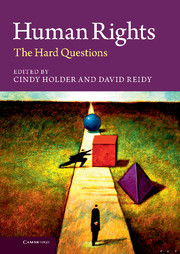Book contents
- Frontmatter
- Contents
- Figure
- List of table
- Notes on contributors
- Introduction
- Part I What are human rights?
- Part II How do human rights relate to group rights and culture?
- Part III What do human rights require of the global economy?
- 8 What do human rights require of the global economy?
- 9 Universal human rights in the global political economy
- 10 Human rights and global equal opportunity
- Part IV How do human rights relate to environmental policy?
- Part V Is there a human right to democracy?
- Part VI What are the limits of rights enforcement?
- Part VII Are human rights progressive?
- Index
- References
9 - Universal human rights in the global political economy
Published online by Cambridge University Press: 05 May 2013
- Frontmatter
- Contents
- Figure
- List of table
- Notes on contributors
- Introduction
- Part I What are human rights?
- Part II How do human rights relate to group rights and culture?
- Part III What do human rights require of the global economy?
- 8 What do human rights require of the global economy?
- 9 Universal human rights in the global political economy
- 10 Human rights and global equal opportunity
- Part IV How do human rights relate to environmental policy?
- Part V Is there a human right to democracy?
- Part VI What are the limits of rights enforcement?
- Part VII Are human rights progressive?
- Index
- References
Summary
The post-World War II project for the protection of human rights, which features a growing body of international law and associated international institutions, is assumed to have changed the nature of sovereignty. While in the past is was accepted that how another state treated its citizens was of no concern to others, the creation of the international human rights regime meant that states could no longer claim legitimate sovereignty in the face of gross violations of human rights. In short, and according to this view, to past definitions of state sovereignty, which included the existence of a central government, the capacity to secure the borders of a particular territory and exclusive rights to the means of violence was added a good human rights record. The failure to embrace this addition brought the threat of delegitimization and exclusion from international society (Vincent 1986).
This model continues to inform the policies and practices of government and non-governmental organizations alike. However, the advent of new technology, particularly communications technology, has enabled the globalization of production, finance and exchange, creating social networks that challenge past understandings of community, sovereignty and authority. The increasing extent and intensity of networks for material exchange on a global scale is paralleled by networks for social exchange, heightening awareness of alternative social orders and ways of conceptualizing human rights, duty and dignity. Although research into globalization has exposed weaknesses in claims for the survival of an international order, solutions for questions of human rights continue to be sought in an international regime built upon notions of the state, sovereignty, and international law that remain “steadfastly unaffected” (Camilleri and Falk 1992, 1).
- Type
- Chapter
- Information
- Human RightsThe Hard Questions, pp. 174 - 192Publisher: Cambridge University PressPrint publication year: 2013



